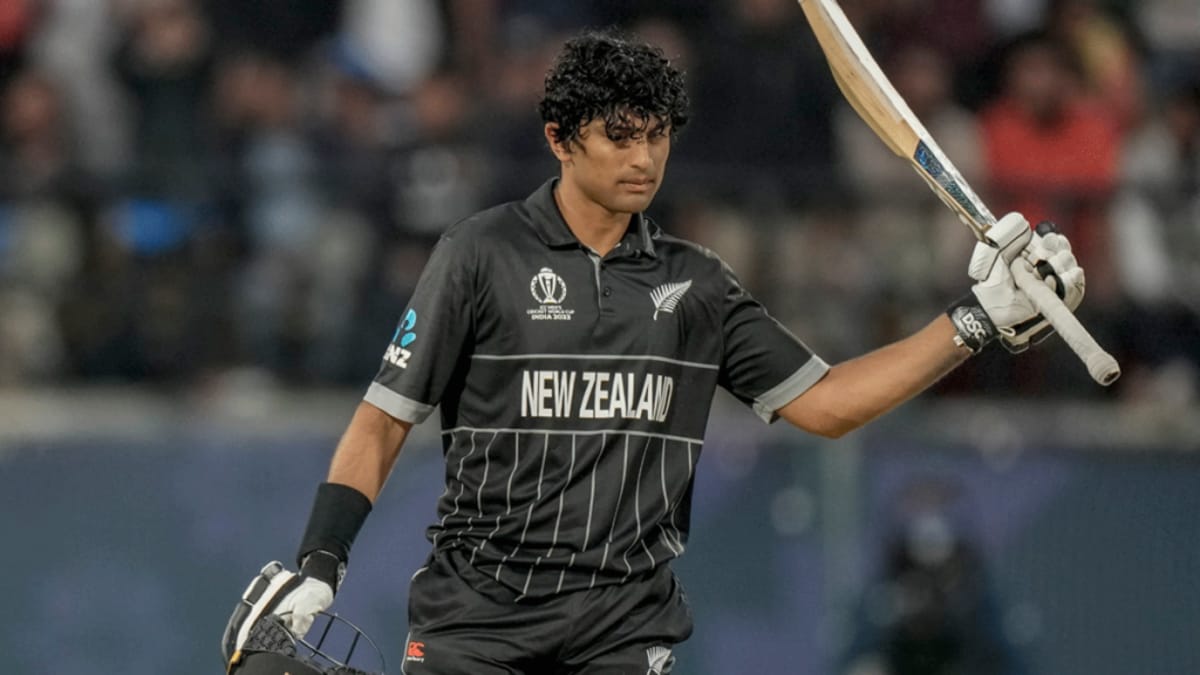Michael Bracewell, Latham, and Rachin Ravindra secure New Zealand's place in the semi-final.
While many teams are in transition right now, New Zealand has demonstrated throughout this Champions Trophy that their new generation is ready for the big time. It was not so long ago that Kane Williamson was carrying this batting line-up. It appears that Rachin Ravindra desires that duty right now. He didn't mind being put in a new position. He didn't hesitate when he had to leave at 15 for 2. He didn't stop smiling when he brought up his hundred, an innings that confirmed not just his team's spot in the semi-finals but also India's. Bangladesh and Pakistan have officially been eliminated. This was a game that Najmul Hossain Shanto's team had to win to stay alive. However, they batted as though it were too much trouble. Bangladesh started at nearly a run a ball. But ten of the next 15 overs went for three runs or fewer. Mushfiqur Rahim and Mahmudullah fell from the pressure created in this period. In a game where the outcome was crucial, their combined 511 matches' worth of experience only contributed six runs. Their wickets left Shanto with no way forward. He kept having to readjust to a new partner, to a new match situation, and in the end, produced a staccato innings of 77 off 110. He could have improved. The others should have done better.
Taskin Ahmed and Nahid Rana raised Bangladesh's hopes with a fiery opening spell, rattling Will Young's stumps in the first over and snaring Williamson for a rare single-digit score. At that point, there were a lot of people in the infield. The entire atmosphere was alive, and the crowd joined in the fun as well. Into this walked Ravindra. One of the best things about his batting is his touch. It's so pure. He started at No. 4 because Daryl Mitchell was ill and needed to be replaced. There was a possibility that he wouldn't be able to play to his full potential. But as luck would have it, he began his innings within the field restrictions and that meant he could profit from his timing.
His first five fours were all about finding the gaps because his timing always took care of the rest.
Ravindra had to wait 11 overs since the field spread to find his next boundary but that didn't mean he was stagnant. His first 23 runs came off 21 balls with five fours. His subsequent 28 runs came from 29 balls, including one four. Between all of that, there was one chance. If Tanzid Hasan had been able to hit a direct hit in the 12th over, he might have been run out because of a miscommunication with his Wellington teammate Devon Conway. Bangladesh weren't able to take their chances. New Zealand did. Williamson did have a hand in proceedings here, picking up smart catches at short midwicket and cover.
Michael Bracewell, after wrapping up an uninterrupted ten-over spell, ran 30 yards to his right to pick up a diving catch that probably wasn't even his. But he made the decision to take control, and it worked. Bangladesh also weren't able to rotate strike. New Zealand could. Those were the two teams' greatest points of difference. The pitch did become much better for batting under lights, though, a fact Mitchell Santner was looking forward to when he won the toss and decided to chase and of all people, Bracewell was his ace in the hole with the ball. The 34-year-old offspin-bowling allrounder himself couldn't believe he had taken 4 for 26. "Funny one, once you let go [of the ball], you don't have much control what happens at the other end," he said in the interview in the middle of the match.
Bracewell contributed 43 of 178 dot balls that plagued Bangladesh. To locate an innings in which they had paced themselves so badly, you have to go back to 2012. The choices they made to escape the rotating strike were not ideal. It was a struggle. It's possible that the afternoon pitch was too slow to get the ball into gaps. Mushfiqur made a play against Bracewell, but his slog sweep was insufficient to clear the long boundary. Bangladesh were 106 for 4 in the 23rd over. Mahmudullah made an ill-advised turn down the track and skewed a leading edge to cover at a time when consolidation was actually needed. Bracewell contributed to his success by slowing his pace down. Bangladesh contributed considerably more. They exit the tournament having faced more than 50 overs of dot balls. Their decision-making left them so short on batting resources that they had Taskin on strike for the 45th over and it ended up as a maiden.
The Black Caps were completely flexed during the death overs. They were content at one point to have just three fielders instead of the allowed five on the boundary. Bangladesh were reminded what could have been towards the end of the chase when there was sharp turn, leading edges, low bounce and even a direct-hit run-out. Ravindra was 26 when Tanzid missed the wicket, and the runs that went missing—260—would have made this game so much more competitive. The wicket merely added to their regret at the one that went missing. As it happened, New Zealand went into the chase knowing all they needed were a couple of partnerships and they got those. Ravindra put on 57 runs with Conway and then 129 with Tom Latham, who is so good as a crisis manager. During the zombie apocalypse, you can almost picture him side-kicking whoever leads the remaining human population. First things first, though, there's an ICC trophy up for grabs.






